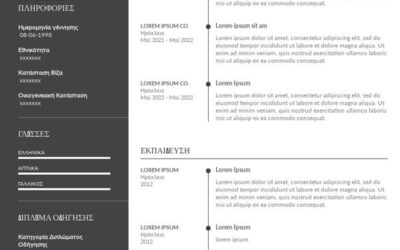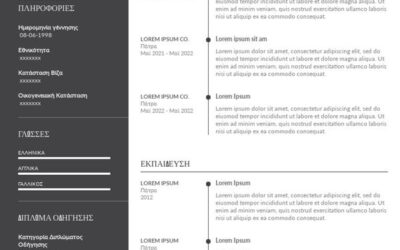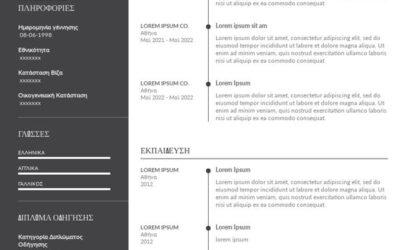In fact, their role is so integral and in demand that the job market for this line of work is predicted to grow by 30% in the next decade, making it a lucrative career path to take. However, the hiring process in this field is often long and arduous, and the competition can be incredibly fierce.
That’s why you’ll need a compelling flight attendant resume that will make your application stand out from the rest, but writing one is typically easier said than done.
That’s where we come in; we will help you create a well-written resume that can increase your chances of landing your dream job as a flight attendant.
Our guide contains everything you’ll need to write a compelling flight attendant resume – from helpful tips and examples to a detailed template you can follow.
So, without further ado, let’s dive right in.
Example of a Flight Attendant Resume
To give you an idea of what you need to include, here’s a flight attendant resume example you can check out.
Flight Attendant
(518) 358-2429
jane.smith@resume-example.com
Brooklyn, NY
Linkedin.com/in/jane.smith
Professional Summary
Accomplished flight attendant with 7+ years of experience in managing in-flight operations and providing excellent customer service for domestic and international flights. Well-trained in emergency medical and first aid techniques for quick emergency response. Received a 99.5% passenger satisfaction score at Intercontinental Airlines in 2018. Committed to providing the same high-quality services as ABC Airlines’ new flight attendant.
Work Experience
Senior Flight Attendant
Intercontinental Airlines
July 2016 to Present
- Suggested a more efficient flight boarding system that reduced delays by 15%
- Received a 99.5% approval rating from passenger satisfaction surveys
- Managed 1,000+ hours of in-flight operations for international and domestic flights
- Trained and managed new junior cabin crew members as a senior member of the cabin crew
Flight Attendant
XYZ Airlines
August 2013 to June 2016
- Helped resolve several passenger conflicts mid-flight and prevented them from escalating
- Assisted thousands of passengers with their needs, including securely stowing carry-on bags in the overhead compartment
Educational Background
Bachelor of Science in Hotel and Tourism Management
New York University
2007 to 2011
Skills
- CPR and First-Aid
- Intercom Operation
- Plane Evacuation Protocols
- Emergency Procedures
- Pre-Flight Briefings
- Communication and Interpersonal Skills
- Time Management
- Teamwork
- Problem-Solving
Awards and Certifications
First Aid Certification – American Red Cross
First Aid, CPR, and AED Instructor – National Safety Council
Languages
- English – Native
- Spanish – Proficient
- French – Advanced
- German – Conversational
Average Salary and Rates for Flight Attendants
As mentioned, flight attendants play a significant role in the passengers’ in-flight experience, and the market’s steady growth makes it a lucrative career path to take. However, how much do cabin crew members actually make?
The median salary for flight attendants in 2019 was around 56,000 USD, although others can earn as much as 80,000 or more. Some of the highest-paying states for flight attendants include Oregon, Pennsylvania, and Washington.
Flight Attendant Resume: How to Write One for Hiring Success
Before you can showcase your exceptional flight attendant skills, you will need to write an effective flight attendant resume that will impress the hiring managers enough to make you a part of their airline’s cabin crew.
Your resume should include all the critical information relevant to your application for the flight attendant position. So, what information should you have on your resume?
Most flight attendant resumes include the following information:
- Your contact information
- Relevant work experience
- Educational background
- Skills related to the field
You can also include information such as:
- Any awards or certifications
- Languages
The Ideal Flight Attendant Resume Format: How Yours Should Look Like
So, how do you make a professional-looking resume for your application as a flight attendant? Nowadays, the most popular format used for flight attendant resumes is the reverse-chronological format.
Using this format means that you start with your most recent achievements, then work your way down to the earliest relevant information.
Of course, other forms are available, but the reverse-chronological one ensures your potential employer sees your most recent and relevant achievements first.
Aside from that, you should also consider the following aspects when formatting your resume:
- Margins
- Font and font size
- Line spacing
- Length
For the margins, it’s best to stick to a one-inch margin on every side, then opt for a professional-looking font like Roboto or Calibri for the text’s font. The text size should be around 14 to 16pt for headers, while it should be only about 11 to 12pt for the text body.
The text should be at least 1.0 or 1.15 lines apart, and your entire resume should not be more than one page. Following these guidelines will make your resume look neat and professional-looking.
Where to Start? – Start with a Good Header
A compelling flight attendant resume starts with a good header. Headers usually include all relevant personal information about you, such as your name, profession, and contact details.
It’s also one of the first sections the hiring manager will see, so make sure that this part is well-organized and short so that your resume looks more professional.
Avoid rushing when writing this section since one mistake, particularly with your contact information, can potentially cost you that flight attendant position you’re vying for. So, what exactly should you include?
- Your full name
- Your factually correct title
- Current phone number and email address
- Location
- Related social media accounts
Examples of a Good and Bad Header
Flight Attendant
(630) 520-0658
anna.adams@email.com
Chicago, Illinois
Linkedin.com/in/lisaadams
In-Flight Hostess
(630) 250-0658
annabanana@email.com
Photo or No Photo?
You can also include a photo in the header, but whether or not you should depends on what country you’re applying to.
In this case, if you’re applying to the US, Australia, or Canada, it’s better to avoid including your photo unless the company you’re applying to specifically asked you to do so.
This is because most airlines in the said countries prefer resumes with no pictures to protect them against any allegation that an applicant was declined due to factors like age, race, and weight.
However, if you’re applying to European countries except for Ireland, the UK, and the Netherlands, we recommend adding your photo, as it’s considered standard practice for flight attendant resumes. The same is observed in airline companies based in the Middle East, Asia, and South America.
About You – What to Write in Your Flight Attendant Professional Summary or Objective
After the header, the next critical part of your resume is your professional summary or resume objective. This serves as your introduction to the airline recruiter, so make sure it perfectly encapsulates the essence of your resume.
Professional summaries are as the name suggests; they give a quick overview of your experiences and achievements as a flight attendant. Meanwhile, a resume objective summarizes what you hope to achieve by joining their company.
So, which one do you use? We recommend a flight attendant professional summary for experienced cabin crew members since it allows you to use your previous experiences and achievements to convince the hiring managers to pick your application.
In contrast, we recommend first-time applicants use a flight attendant resume objective because it explains why you’re applying to the company and how hiring you can benefit them.
Examples of a Flight Attendant Resume Summary
Work Experience – How to Showcase Your Flight Attendant Experience
Now that you have your introduction, the next section is another critical one if you’re applying for a flight attendant job – your work experience.
Even if you’re a first-time applicant with no previous in-flight experience, it’s still crucial that you list down any work experience that might be relevant to your new profession. Doing so will help recruiters better gauge how good a fit you’ll be for their airline.
Make sure you structure it correctly to highlight everything that can make your application stand out. In this case, you need to include the following information:
- Position
- Dates you held the position
- The company’s name
- Your responsibilities and any achievements
Academic Achievements – What to Include and What Not to Include
You don’t need to have an advanced degree to work as a flight attendant since airlines will provide you with the formal training required to become part of their cabin crew. However, in general, you will still need at least a high school diploma or GED to qualify as one.
Still, if you have a bachelor’s degree or more advanced degrees in related fields, like tourism or hospitality management, it’s better to include it.
With that said, if you add your academic background to your resume, you need to include the following information:
- Your degree and major
- The name of the university you attended
- The years you attended
An example would be:
University of California
2009 – 2013
Relevant Skills – Showcasing Your Flight Attendant Skills
Aside from the previous sections, another segment of your resume considered critical is your list of relevant skills. After all, the hiring manager needs to see you have what it takes to provide excellent customer service to passengers and carry out all your flight attendant duties.
Moreover, these recruiters typically have a list of skills they want to see in applicants, so make sure you include all the relevant ones you have.
So, what skills do airline companies typically look for in flight attendants?
Hard Skills
- CPR and First Aid
- Safety Orientation Announcements
- Intercom Operation
- Plane Evacuation Protocols
- Emergency Procedures
- Counter-Terrorism Measures
Soft Skills
- Communication Skills
- Interpersonal Skills
- Teamwork
- Time Management
- Language Skills
- Safety Consciousness
What Else to Add? – Other Sections You Can Include
The sections we mentioned above are the most crucial ones you need to include in your flight attendant resume. However, that doesn’t mean you can’t add anything else to beef up your application.
It’s critical to keep your resume well-organized and professional, ensuring that you only include what’s relevant to the position you’re applying for. Still, adding extra sections to your resume can work to your advantage since it personalizes it and showcases your individuality.
Aside from that, additional sections can also show the company you’re applying to any other information that can help them evaluate whether or not hiring you would be advantageous for them.
So, what else can you add to your resume?
Awards and Certifications
If you’ve taken extra courses related to your field, such as training in first-aid and CPR, adding an “Awards and Certifications” section can be an excellent way to tell your would-be company.
These will show them that you have more to offer besides the basic training you received as a flight attendant.
Languages
Flight attendants work on domestic and international flights. In addition, they cater to a diverse pool of passengers – many of whom come from different countries worldwide.
So, if you know another language aside from your native tongue, adding a language proficiency section can be a fantastic way to let the hiring managers know. In fact, most airlines require flight attendants to be bilingual, with English being one of the required languages you need to know.
With that said, adding a “Language” section to your resume can give you an edge over your competition, especially if you’re proficient in multiple languages.
Boosting Your Flight Attendant Resume – Top 4 Helpful Tips
Now that you know what sections to include in your resume, let’s discuss what you can do to further improve your chances of attaining your dream job.
With that said, we have compiled four helpful tips you can follow to boost your flight attendant resume and become the newest cabin crew member of your target airline.
Keep everything short and straight to the point
Ideally, your resume shouldn’t be longer than a single page so that recruiters can get all the information they need without sifting through all that information.
That’s why it’s better to keep everything short and straight to the point to avoid your application being sent to the rejection pile.
Proofread everything
There’s nothing that says “unprofessional” more than errors in the resume. Not only does this show unprofessionalism, but it can also show how little you pay attention to the details.
Moreover, not proofreading your work beforehand can also potentially cost you the position, especially if the errors are with your contact information. After all, if the company can’t contact you, they will most likely move on to the next applicant.
Personalize your resumes
It might be tempting to submit one resume to all the airlines you’re applying to, but this can be counter-productive. Every airline have their own set of requirements, and presenting one resume to each one can make you leave out crucial details that the company is looking for.
Practice honesty
Your resume should highlight all your positive points, but make sure that everything you include is accurate and factual. Avoid making up information just to make your resume look more appealing.
Summary – Writing the Perfect Flight Attendant Resume
Having a well-written and compelling flight attendant resume can increase your chances of landing your dream job with the airline of your choice. However, it can be tough to do so if you don’t know what to include.
With that said, make sure you have the following sections when writing the perfect flight attendant resume:
- The header is accurate and well-updated.
- Your professional summary highlights your experience, skill, and achievements and mentions the company you’re applying for.
- Your educational background is short and clear.
- All your most relevant skills are included.
- Other sections like certifications and languages are present too.
Round It All Out with a Well-Written Cover Letter
Once you have a killer resume, the last part would be to round it out and complement it with a well-written cover letter.
A cover letter will better explain why you chose this specific airline to apply to and how they can benefit from your expertise and experience as a cabin crew member. However, make sure that it complements – not contradicts – your resume.
Unsure of how to write one? You can check out our cover letter examples to learn how to write a fantastic flight attendant cover letter that will complement what’s already written in your resume.
Frequently Asked Questions
How long should my flight attendant resume be?
In general, your resume as a flight attendant should only be one page – two pages as the maximum. Any longer than that and you risk losing the attention of the person looking over your application.
What are the typical flight attendant duties?
Flight attendants are responsible for ensuring the flight goes as smoothly as possible. This means they are in charge of ensuring the passengers’ safety and comfort while the plane is in mid-flight.
Can you become a flight attendant without any experience?
Yes, you can. However, you will need to attend a flight attendant training program before you can join the rest of the cabin crew on flights.
How should your attitude be as a flight attendant?
Flight attendants need to deal with a diverse range of individuals, many of whom come from different cultural backgrounds. That’s why you need to maintain a positive attitude as a flight attendant so that you can deliver an exceptional customer service experience to the passengers.
Looking for More? Check Our Other Examples for Flight Attendant Resumes
 |
 |
 |
 |






